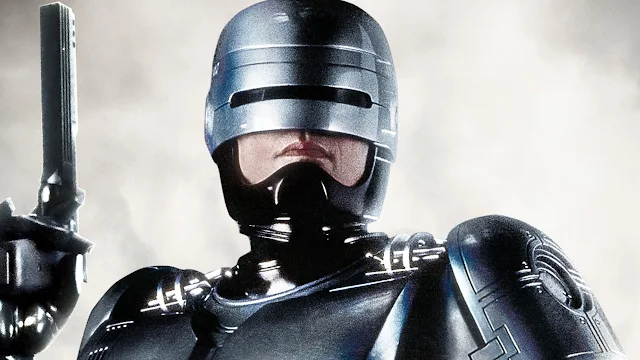Directives of Dystopia
Satire, Identity, and Corporate Greed in Paul Verhoeven's RoboCop
The 1987 film RoboCop, directed by the visionary Paul Verhoeven, is far more than a standard 80s action flick. It stands as a classic example of cinematic satire that utilizes science fiction to deliver a biting critique of societal decay. Through its hyper-violent portrayal of corporate greed, media sensationalism, and the dehumanizing effects of unchecked capitalism, RoboCop delves into the dark and exaggerated aspects of a dystopian future to shed light on the flaws of contemporary society.

The Narrative: Death and Resurrection in Old Detroit
Set in a near-future Detroit on the brink of collapse, the narrative follows Officer Alex Murphy, a dedicated family man transferred to the dangerous Metro West precinct. The city is financially ruinous, effectively owned by the mega-corporation Omni Consumer Products (OCP). OCP plans to bulldoze "Old Detroit" to build "Delta City," a utopian paradise for the rich, but they first need to pacify the criminal element.
When Murphy is brutally executed by the crime lord Clarence Boddicker, OCP seizes his body. Technically dead, he is legally OCP property. They resurrect him as RoboCop, a cyborg law enforcement unit programmed with three prime directives: Serve the public trust, Protect the innocent, and Uphold the law.
However, the story pivots on a hidden "Directive 4," which prevents RoboCop from arresting any OCP executive. This directive represents the ultimate thematic conflict: the struggle between moral duty and corporate shackles. As Murphy's memories surface, he goes rogue to avenge his own death and expose the corruption linking the street gangs to the boardroom.
Theme 1: Corporate Greed and Unchecked Capitalism
RoboCop provides a scathing critique of corporate influence over government, serving as a cautionary tale about the Reagan-era economic boom. The dystopian portrayal of a city where the police force is privatized and strikes are broken by machines reflects the dangers of allowing profit-driven entities to wield state power.
The antagonist Dick Jones, Senior Vice President of OCP, epitomizes this banality of evil. He treats the police force not as public servants, but as line items on a budget sheet. His rival project, the ED-209 enforcement droid, is a metaphor for military-industrial excess—bloated, clumsy, and lethally malfunctioning.
The ED-209's tragic malfunction during a boardroom demonstration, where it violently kills a junior executive, is played with dark absurdity. No one mourns the dead man; they only worry about the stock price. This satirically underscores a society where human life is secondary to quarterly projections.
Theme 2: Media Sensationalism and Desensitization
Verhoeven employs a brilliant framing device: "Media Break," a news program that interrupts the narrative. The anchors report on nuclear threats, satellite lasers, and horrific crime with chipper, unwavering smiles. This juxtaposition highlights a society that has become completely desensitized to violence.
The film integrates fictional commercials that serve as cultural barometers. The "Nukem" board game glorifies nuclear holocaust as family fun, while the "Family Heart Center" advertises commercial organ transplants like used cars.
"I'd buy that for a dollar!"
This catchphrase, repeated by a lecherous TV host, becomes the mantra of the film's populace. It reflects a culture devoid of empathy, where everything—including dignity and suffering—is a commodity to be consumed for cheap entertainment.
Theme 3: The American Jesus & The Ghost in the Machine
The transformation of Alex Murphy into RoboCop is the central narrative device driving the exploration of dehumanization. Verhoeven has explicitly stated that he views RoboCop as an "American Jesus" figure. Murphy dies a brutal death (crucifixion), is resurrected by a higher power (OCP/God), and walks on water (the final showdown in the steel mill water).
However, the technological aspect twists this theology. Murphy's humanity is systematically stripped away, his memories erased, and his body reduced to a product line. This narrative mirrors concerns about the potential loss of individuality in a society increasingly reliant on technology.
The true emotional core of the film is Murphy's struggle to reclaim his soul. The scene where he returns to his empty home, viewing holographic memories of the life that was stolen from him, is heartbreaking. It asserts that while corporations can own the body, they cannot fully commodify the human spirit. When he finally removes his helmet, revealing his human face stretched over machinery, it is an act of reclaiming his identity.
Conclusion: "Nice Shootin', Son. What's Your Name?"
"RoboCop" ends with a powerful affirmation of self. After defeating the corruption of Dick Jones and overcoming the programming of Directive 4, the OCP Chairman asks the cyborg his name. He does not reply with a serial number or "RoboCop." He smiles and says, "Murphy."
By exaggerating reality in a darkly humorous manner, the film delivers a thought-provoking message about the importance of preserving human values, empathy, and individuality in the face of a future dominated by profit-driven interests. Its enduring impact underscores the potency of satire as a vehicle for societal reflection, proving that fictional dystopias often reveal the most about our current reality.















